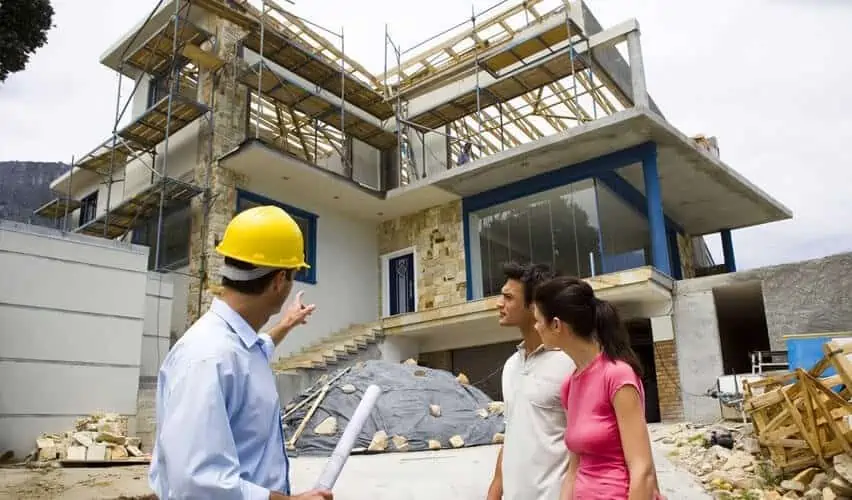In the complex realm of construction projects, the role of a general contractor is pivotal. Serving as the backbone of project success, general contractors ensure that the myriad elements of construction—from planning and staffing to execution and compliance—are seamlessly integrated.
They are not merely participants but the driving force behind the construction process, coordinating with project owners, subcontractors, and suppliers to transform architectural visions into tangible structures.

Their expertise in overseeing the day-to-day activities of a construction site ensures that projects adhere to timelines, budgets, and building codes, directly influencing the project’s success.
By understanding the multifaceted responsibilities of general contractors, one can appreciate their indispensable role in the construction industry.
Understanding the Role of General Contractors
General contractors are essential leaders in the construction industry, tasked with the critical responsibility of managing the overall execution of a project. Their role involves a broad spectrum of activities, from the initial assessment of project details and the hiring of skilled tradespeople to the supervision of construction activities and the management of project finances.

A general contractor acts as the point of contact between the project owner and the various parties involved, ensuring that the project adheres to plans, schedules, and regulatory requirements. By effectively juggling these responsibilities, general contractors ensure that projects are completed efficiently, safely, and to the highest standards.
Coordination and Project Management
General contractors are integral to the project management phase, where meticulous coordination is paramount. Their role spans the entire lifecycle of a project, from initial planning to final execution. They develop the project plan, which outlines all necessary steps and timelines, ensuring that each task aligns with the critical path—key milestones that dictate the project’s schedule.

Through effective project management, general contractors maintain control over the scope, cost, and quality of the project, adjusting strategies as needed to meet project goals and deadlines.
The Bidding Process and Project Delivery
The bidding process is a foundational aspect of a general contractor’s responsibilities, where they prepare and submit project proposals to potential clients. This process includes detailed cost estimations and timelines that are crucial for project delivery.
Once a contract is awarded, the general contractor’s role shifts to ensuring that all aspects of the project are executed as planned. This encompasses overseeing construction activities, managing resources, and maintaining communication with all stakeholders.
The contractor’s responsibility extends to solving unforeseen issues and ensuring the project remains on track and within budget.
Key Phases in a Construction Project
A construction project typically progresses through several key phases, each critical to its success. The initial phase involves project conception and the detailed drafting of plans and permits.
Following this is the design phase, where architects and engineers create detailed blueprints and specifications. The pre-construction phase sees the general contractor hiring subcontractors and finalizing all preparatory tasks.

During the construction phase, the actual building takes place, requiring rigorous management of construction activities, materials, and manpower. The final phase involves project completion and review, ensuring all contractual obligations are met, and the project meets all regulatory standards and client expectations.
Throughout these phases, the general contractor plays a crucial role in steering the project towards successful completion, managing complexities, and ensuring seamless progression from one phase to the next.
Initial Planning and Design
In the early stages of a construction project, the general contractor plays a pivotal role in setting the foundation for success. They work closely with the project owner to understand the vision and project requirements, translating these into actionable plans.
During this phase, the general contractor collaborates with architects and engineers to ensure that the design meets both the functional and aesthetic needs of the client while also aligning with budgetary constraints.
Their expertise helps to anticipate potential challenges and integrate solutions early on, setting the stage for a smooth transition to physical construction.
Building and Construction Phase
During the building and construction phase, the general contractor’s presence on-site is critical. They oversee all construction work, managing the daily operations at the construction site to ensure that architectural plans are followed accurately.
The general contractor coordinates with various subcontractors, ensuring that each team contributes to the progress efficiently and safely. Their oversight is essential in maintaining the project schedule and quality standards, handling everything from the sequencing of tasks to the application of materials, and troubleshooting issues as they arise, thereby safeguarding the project’s integrity and timeline.
Regulatory Compliance and Safety Protocols
Adhering to building codes and safety regulations is non-negotiable in any construction project. General contractors ensure that every aspect of the project complies with local, state, and federal regulations, which is vital for legal and operational success.
They are responsible for obtaining all necessary building permits and regularly inspecting the site to ensure compliance with safety protocols. This oversight helps prevent legal complications and ensures the safety of all personnel involved in the project.
The general contractor’s knowledge of the latest safety regulations and building codes is crucial for mitigating risks, avoiding costly fines, and preventing delays. Their proactive management of regulatory compliance not only protects the project owner but also enhances the overall safety and quality of the construction project.
Managing Building Permits and Licenses
General contractors are essential in navigating the complex process of obtaining building permits and ensuring all construction activities are properly licensed. This involves meticulous preparation and submission of detailed documents that comply with local zoning laws and building codes.
Being a licensed general contractor, they have the expertise and authority to handle such legal requirements, ensuring that every aspect of the project adheres to regulatory standards.
This not only prevents legal issues but also assures project owners that the construction is executed within the bounds of the law, securing the integrity and progress of the project.
Implementing Safety Protocols on the Job Site
The implementation of safety protocols on the construction site is a critical responsibility of the general contractor. They are tasked with establishing and maintaining a safe work environment to protect all workers and visitors from potential hazards.
This includes conducting regular safety training, ensuring the use of appropriate personal protective equipment, and adhering to all relevant safety regulations.
By vigilantly monitoring the job site, the general contractor ensures that safety measures are rigorously followed, thereby minimizing the risk of accidents and enhancing overall site efficiency.
Financial Management and Quality Control
General contractors play a crucial role in the financial management and quality assurance of construction projects. They are responsible for preparing and overseeing the construction budget, ensuring that all expenses are tracked and controlled to avoid overruns.
This financial stewardship extends to managing the payment chain, from timely payments to subcontractors to securing funds from project owners, ensuring liquidity and fiscal health throughout the project’s lifecycle.
Simultaneously, general contractors enforce stringent quality control measures, regularly inspecting the work performed and materials used to ensure they meet the project specifications and standards.
This dual focus on financial prudence and quality excellence guarantees that the project not only stays within budget but also achieves the high standards expected by all stakeholders.
Effective Cost Management Strategies
Effective cost management is vital in the construction industry to prevent cost overruns and maintain financial stability. General contractors employ several strategies to manage expenses effectively, including accurate initial cost estimations, thorough vetting of suppliers, and adopting efficient project management tools.
Regular financial reviews and forecasting also allow general contractors to anticipate financial issues and adjust budgets proactively. These practices not only safeguard the project from financial pitfalls but also ensure that resources are utilized optimally, enhancing the overall financial management of the project.
Upholding Quality Through All Stages
General contractors ensure high-quality standards throughout all stages of a construction project by implementing rigorous quality management systems. This starts with the selection of qualified subcontractors and sourcing high-grade materials.
Regular on-site inspections and audits are conducted by construction managers to monitor compliance with the project specifications and industry standards. By addressing any discrepancies immediately and maintaining continuous oversight, general contractors ensure that each task is executed correctly, thus upholding quality from the groundwork to the final touches, fulfilling one of their most essential tasks.
Subcontractor and Supply Chain Management
Managing subcontractors and the supply chain is a critical function of general contractors, ensuring that every component of the project is executed efficiently. This process involves selecting subcontractors who align with the project’s needs and standards, and establishing clear contracts that set out expectations, timelines, and quality requirements.
Effective supply chain management is also crucial, involving strategic sourcing of materials and ensuring their timely delivery to keep the project on schedule. By maintaining strong relationships with suppliers and subcontractors, general contractors can leverage these connections for better terms and improved resource availability.
This comprehensive management approach not only streamlines operations but also significantly impacts the project’s success, emphasizing the general contractor’s pivotal role in orchestrating all moving parts.
Coordinating with Specialty Contractors
General contractors effectively coordinate with specialty contractors to handle specialized tasks that require distinct expertise. Whether it involves electrical work, plumbing, or custom fabrications, these specialized tradespeople are critical for addressing complex components of construction projects.
General contractors manage these relationships to ensure that specialty contractors deliver quality work that aligns with the overall project objectives and timelines.
This coordination is essential for maintaining a seamless flow of operations and ensuring that all specialized tasks are completed to the highest standards.
Overseeing Supply Chain and Material Sourcing
A general contractor’s role in overseeing the supply chain and material sourcing is crucial for maintaining project timelines and quality standards. They ensure that all building materials required for the project are sourced efficiently and meet the necessary quality criteria.
By managing relationships with suppliers and monitoring the supply chain, general contractors can prevent delays and cost overruns associated with material shortages or logistical issues. Their strategic oversight helps maintain a steady flow of materials, ensuring that the project progresses without interruptions and adheres to planned schedules and budgets.
Communication and Problem Solving in Projects
Effective communication and problem-solving skills are indispensable for a general contractor to ensure the success of a construction project. General contractors act as the central communication hub among all parties involved, including subcontractors, suppliers, project owners, and regulatory bodies.
By maintaining clear, continuous communication, they prevent misunderstandings and ensure that everyone remains aligned with the project goals. Moreover, their problem-solving skills are continually put to the test in addressing the inevitable challenges that arise during construction.
Whether it’s unexpected delays, budget issues, or regulatory compliance problems, a general contractor’s ability to quickly identify solutions is critical for keeping the project on track and achieving a successful outcome. These skills are not just beneficial but essential for navigating the complexities of construction projects efficiently.
Keeping All Parties on the Same Page
Effective communication is essential in ensuring that all parties involved in a construction project are on the same page. General contractors employ various techniques such as regular progress meetings, updated reports, and digital tools like project management software to facilitate clear and continuous communication.
These practices help in aligning the expectations of subcontractors, suppliers, and project owners, ensuring that everyone understands their roles and responsibilities.
By fostering an environment of open communication, general contractors mitigate the risk of misunderstandings and ensure collaborative problem-solving throughout the project lifecycle.
Resolving Conflicts and Managing Delays
General contractors are adept at resolving conflicts and managing delays, crucial skills in maintaining project momentum. They utilize proactive problem-solving skills to address issues such as delayed payments and schedule setbacks promptly.
Strategies include negotiating with suppliers and subcontractors, reallocating resources, and adjusting project timelines if necessary. By maintaining a hands-on approach to day-to-day activities and being prepared to make quick decisions, general contractors can effectively minimize disruptions, ensuring that projects remain on track and within budget, despite inevitable challenges.
The Comprehensive Role of General Contractors in Commercial Construction
In commercial construction, general contractors oversee the entire project from inception to completion, ensuring every phase aligns with the overarching goals of the project owner. These professionals manage the construction process meticulously, coordinating with construction companies to secure the necessary workforce and resources.
Their responsibilities extend beyond mere oversight; they are actively involved in every aspect of construction work, from groundbreaking to final inspections.
Ensuring Compliance and Quality in Multi-Project Management
General contractors are pivotal in managing multiple projects, where their ability to juggle various tasks simultaneously underpins the success of each venture. These seasoned professionals ensure that each project adheres to local regulations and industry standards by meticulously sourcing materials and implementing rigorous quality controls.
They also champion effective cost-saving strategies, optimizing resources and streamlining operations to reduce expenses without compromising on quality. As prime contractors, they bear the ultimate responsibility for the project’s construction phase, actively engaging with specialty contractors to fulfill specialized tasks. This comprehensive approach not only adheres to stringent standards but also drives economic efficiency across projects.




